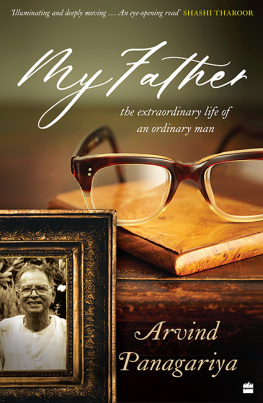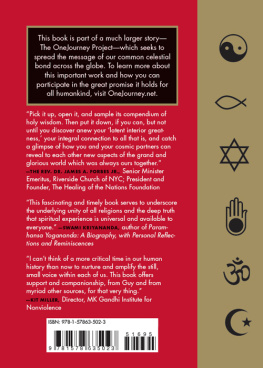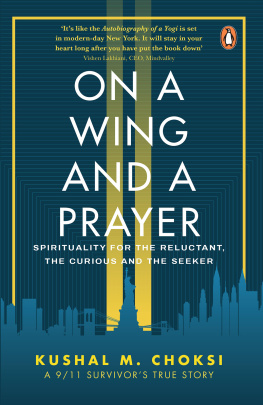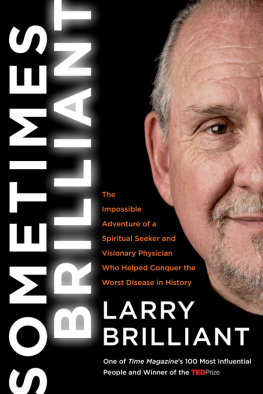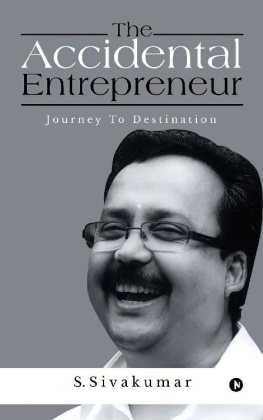Table of Contents
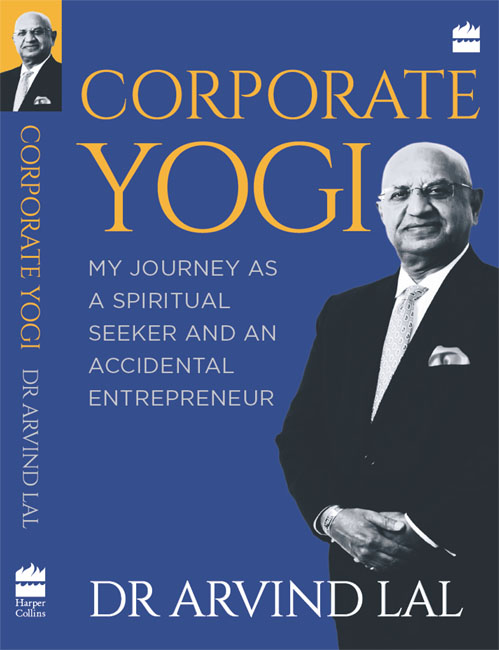
Corporate Yogi
My Journey as a Spiritual
Seeker and an Accidental
Entrepreneur
Dr Arvind Lal

To Babaji for showing me the light
Contents


India is a land of spiritual seekers. Hundreds of great spiritual personalities have taken birth here and have guided spiritual seekers from time to time. The ancient tradition of gurushishya (teacher and disciple) is still followed with great discipline in several parts of this country. The tradition states that the shishya must submit wholeheartedly and indisputably to the guru in order to receive spiritual wisdom. It is only then that the guru shows the spiritual path of ultimate liberation to the shishya. The Hindu culture has numerous gurushishya stories which may sound completely incredible to any person who hasnt experienced them. However, a believer, who has actually lived similar experiences, will not find them astonishing. Before you begin reading my spiritual journey, I leave you with a little disclaimer. A spiritual seeker may have a different experience reading this book as compared to a non-seeker. At the end of reading this book, if I am able to ignite some spiritual thoughts in you, Ill be happy!

Every life is a journey, every life story a travelogue. This is mine. Like most people, I could have just blundered along, spontaneously ricocheting from one episode in my life to the next. But I was fortunate in having a guide to help me find my wayBabaji, who turned what could have been a mundane existence into a meaningful pilgrimage.
His influence on my life has been as profound as it is subtle. I admit that from a readers perspective, my story is riddled with the elements of a potboiler. Beginning with tragedy, it morphs into a tale of redemption, romance and finally, a success story. Running parallel to the surface narrative is another account of an internal journey, a search for the self under the aegis of my preceptor, Babaji.
I first met Babaji in 1974, at Kudsia Ghat on the banks of the River Yamuna in Delhi, with my parents, Dr S.K. Lal and Vimla Lal. Babaji was conducting a three-day havan and it was his first visit to Delhi. I met Babaji for the second time in 1975, at our home in Green Park in south Delhi. The third was in 1977, at his Ashram at Haidakhan near Kathgodam in Uttarakhand. That was the beginning of a very special studentteacher relationship, one that was to last until he left the earth, in 1984. He was to become my lodestar.
What drew me to him? Physically, he was beautiful to look at. His presence was simultaneously tranquil and thrilling, the closest thing to bliss I had ever experienced until that time. And he had all the answers, to questions asked and unasked, and even those I hadnt yet formulated in my mind! His compassion was boundless, his powers divine. The rich fourteen years I spent with Babaji made me realize one thing unmistakably: He was not of this earth, but rather the earth was of his making. So, perhaps the simplest answer to the question is: He gave meaning to my life.
In the impromptu narrative of our existence, we try to impose an illusion of control and a semblance of stability to our lives, by setting goals and working towards them. The fact is we control nothing in the world other than our own thoughts and actions. And none of us has an answer to the question, Ive achieved my goalnow what? Thus, each of us needs a guru, to explain the purpose of existence, and the manner in which we should live to fulfil that purpose. He/She rescues us from pointless meandering by teaching us the why and how of human existence. If I have led a wholesome, productive, healthy, peaceful and successful life, it is entirely by his grace.
India can be a confusing place for spiritual seekersthose who are confronted by a multitude of gods and their avatars. We are a land that boasts of thousands of gods and goddesses. As I was growing up, I would often wonder which god I should believe in and why? The abstractions are boundless. Consider, for a moment, the avatars of VishnuParashuram was the sixth, Rama the seventh. Yet, they coexisted and even encountered each other! So abstruse and transcendent are our scriptures that years of study alone will not help one decode them, without the intervention of a guru. It was Babaji who demystified the Hindu faith for me. He explained the essence of our ancient scriptures and gave me to understand that it all boiled down to just one thing: being a good person. He taught me that it was very easy to be religious, but very difficult to be spiritual.
After his departure from this realm, I would often describe Babaji to people who had not been fortunate enoughfrom my perspective, anywayto meet him in person. I would find them listening to me, and many others, raptly, wavering between fascination and disbelief. At such times, the sheer singularity of my experience struck me: I had lived with a god. I had travelled with him, eaten with him, talked to him for hours on end and watched him as he slept. This book is written in his memorythe closest I can come to sharing with the world what it was like to live in the shadow of a god.
Babaji attracted people from all faiths and walks of liferich and poor, sadhus (nomads) and householders, Westerners and Indians. They were devotees from all religionsHindus, Christians, Muslims, Sikhs, Buddhists, Jews, etc. He did not ask anybody to renounce their religion or to embrace Hinduism. Through his teachings he emphasized the linear route to godliness in this dark age, or Kaliyuga: live your life in Truth, Simplicity and Love (Satya, Saralta and Prem), do ones duty (Karma Yoga) and recite the Lords name (Japa Yoga). These are the five tenets that lead the modern man to self-realization. Babaji was no run-of-the-mill Hindu guru. He manifested in our realm for the specific purpose of spreading the message of Universal Truth across the world, through his devotees.
As Hindus, we believe in the transmigration of the soul. The soul never dies. It only moves from one corporeal abode to another. At the time of death, the soul is released and it is ready to inhabit another body. We also believe in the law of karma. Our karmas are carried from one life to the next. We do not look for empirical proof, because we are imbued with this knowledge, which forms the basic tenets of Sanatan Dharma. Our goal is liberation from the cycle of birth and death. Thus, we are seekers and in our quest for the Ultimate Truth, the guru guides us. If your karma is good, you will meet your guru. Otherwise, better luck next time!
Babajis departure left me with a feeling of emptiness. I wept and was inconsolable, as I had not been at my fathers death. The void left by Babaji would never be filled, but I realized that he had left me a set of guidelines. His teachings would henceforth be the sheet anchor of my life.
When I look in the mirror, I see an ordinary Indian, a simple man who does his best to follow the tenets of his guru. I am a product of modern India, fortunate to have been born in an upper-class family and thus having the privilege of receiving a good education. A touch of Westernization was inevitable. My parents were at ease with the English language, as was my grandmother, and my wife, even more so, to the extent that she spoke almost exclusively in English. As a six-year-old, my daughter, hearing the Italy-born Sonia Gandhi speak on TV, commented that the Congress president spoke better Hindi than her mother. I must admit (and not just for the sake of domestic harmony!) that my wife has polished her spoken Hindi admirably, to be able to handle the 400 staff members at South Asias biggest laboratory located in north Delhi which she heads.


